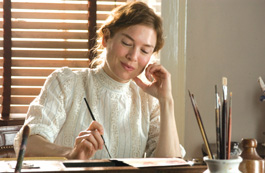home | metro silicon valley index | movies | current reviews | film review

The Weinstein Company, 2006/Alex Bailey
On the bunny side of the street: Renée Zellweger contemplates the fate of the doomed Mrs. Tittlemouse in 'Miss Potter.'
Victorian Hip-Hop
Renée Zellweger's 'Miss Potter' puts the bounce back in Peter Rabbit's creator
By Richard von Busack
BLOOMSBURY scholars alert! This no-holds-barred biopic of Beatrix Potter reveals that the creator of Peter Rabbit, Jemima Puddleduck and other nursery favorites was secretly playing "monkey in the middle" with Vita Sackville-West and Virginia Woolf. Alas, no such luck; Chris Noonan's film is about as dynamic as a tea cozy. Miss Potter tells the staid, late-Victorian story of the young author (Renée Zellweger). In 1902, Potter chafes under parental authority as she avoids an arranged marriage. The focus of her life is in her art; she paints her watercolors, which—in occasional but captivating moments—come to life.
Finally, she meets the similarly patronized Norman Warne (Ewan McGregor), young brother of a firm of publishers. Norman champions her work and falls in love with the author. Then personal tragedy strikes Potter, a tragedy introduced with the usual significant cough. The snarky viewer may think, "Aha, this is when Potter began her little known 'black period,' with The Adventures of Buttolph Buzzard and other even more macabre works." In fact, Noonan does have the little creatures under Potter's paintbrush start to run off in panic and meet terrible fates. The movie is just that literal.
As Warne's sister, Millie, Emily Watson brings more presence than the star. She transcends the fusty Mary Poppins clothes and adds some bittersweetness to the role. Here is a passionate friendship that might have something a bit hidden in it. Watching Watson play Millie is like that story about Charles Laughton acting the part of a father with incestuous longings. Told that the censors wouldn't allow it, Laughton replied, "They can't censor the gleam in my eye." The gleam seems to be there in Watson's eye, but it is lost on Zellweger. Simper queen that she is, the actress relies on her familiar wry twist of the mouth: the scrunching gesture of a woman constantly biting into that too-sour dill pickle that is our lives.
What can be said for Miss Potter? The moment of Beatrix and Norman learning to dance to the music of a wind-up music box is scarcely worth resisting. As her firm but pliant father, Bill Paterson delivers far more than just a set of extravagant whiskers. And the drawings themselves have unkillable charm; unlike Disney's creatures, Peter and his friends are recognizably animals, with unknowable sides, surprised at being looked at, timid at the approach of a human. As an early conservationist—she saved a considerable portion of farmland in North England—Potter was working in an era when "animals were not respected as they are now," as the line went in director Noonan's Babe. Finally, perhaps little girls could see Miss Potter and note how they might be artists some day, despite what the disapproving men say around them. But because of the film's insistence on "empowerment" (dreadful passive word), there's actually less satire of the attitudes and sweetly hermetic qualities of this particular eminent Victorian than there would have been 50 years ago.
![]() Miss Potter (PG; 92 min.), directed by Chris Noonan, written by Richard Maltby Jr., photographed by Andrew Dunn and Chris Seager and starring
Renée Zellweger and Ewan McGregor, opens Friday at selected theaters.
Miss Potter (PG; 92 min.), directed by Chris Noonan, written by Richard Maltby Jr., photographed by Andrew Dunn and Chris Seager and starring
Renée Zellweger and Ewan McGregor, opens Friday at selected theaters.
Send a letter to the editor about this story.
|
|
|
|
|
|